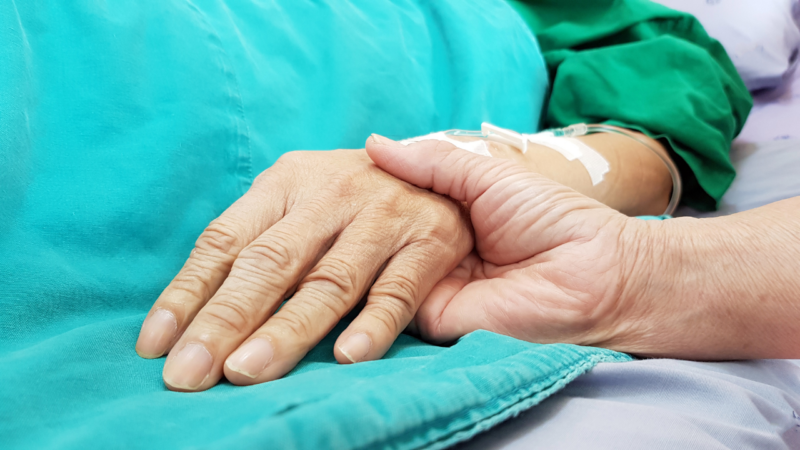“My mum/dad has just been transitioned into palliative care. Can physiotherapy help during this phase of their life?”
Receiving the news that your elderly Mum or Dad, or family member, has been transitioned into palliative care can be an emotionally challenging experience.
During this delicate phase of life, where the focus is on providing comfort and maintaining the best possible quality of life, various healthcare professionals play a crucial role.
Among them, physiotherapists offer valuable support that extends beyond the common misconceptions about their role. This article aims to shed light on the significance of physiotherapy in palliative care and the different but vital role it can play at this time.
Understanding palliative care:
Palliative care is specialised medical care for individuals facing life-limiting illnesses.
It is designed to provide relief from the symptoms and stress associated with the illness, with the goal of improving the overall quality of life for both the patient and their family.
While many may associate physiotherapy with rehabilitation after surgery or injury, its role in palliative care is equally important.
Pain management:
Physiotherapists can employ various techniques to help manage pain.
This may include assisting with relief of pain using techniques such as supported body positioning, hot and cold packs, massage, relaxation techniques, dry needling and transcutaneous nerve stimulation (TENS) where clinically appropriate.
Tailored exercise programs can enhance flexibility and reduce muscle tension, contributing to a more comfortable experience for the patient.
Maintaining functional independence:
Palliative care focuses on improving the patient’s ability to perform daily activities and maintain a level of independence.
Physiotherapists collaborate with other healthcare professionals to create personalised exercise plans that are realistic and achievable based on the patient’s physical condition.
Fatigue and the reduction in physical functioning in life-limiting illnesses are significant factors in the reduced quality of life often seen in these patient groups.
Rehabilitation in palliative care is gaining more and more attention across the allied health sector. It is within the physiotherapist’s scope to determine the right type and intensity of exercise to best assist and to maximise benefit for these patients.
Breathlessness and respiratory support:
Patients in palliative care, especially those with respiratory conditions, may experience breathlessness. Quite often the physiotherapist will be involved in assessing and treating dyspnoea (difficulty breathing) with supported body position and other strategies such as breathing techniques, energy conservation techniques and use of handheld fans.
These techniques may also assist the person to help clear lung secretions.

Improving mobility and comfort:
Limited mobility can significantly impact a patient’s comfort and well-being.
Physiotherapists work to maintain or improve mobility through the use of massage, range of motion or strengthening exercises, or balance training and falls prevention education to help the person manage the physical aspects of daily activities, such as walking and transfers.
Physios can also provide advice on physical aids to improve mobility and management of fatigue.
Emotional support:
Palliative care is not only about managing physical symptoms but also addressing (and fostering) the emotional and psychological well-being of patients.
The role of a physiotherapist in providing emotional support during this challenging phase is often underestimated.
Through engagement in individually tailored therapeutic activities, addressing mental health related issues and incorporating ‘mind-body’ techniques such as mindfulness, physios create a positive environment that promotes a sense of accomplishment and boosts the patient’s mood.
Family and carer education:
Family/carer involvement is beneficial as it provides an opportunity for education on the delivery of treatments when the physiotherapist is absent. They can also be educated in methods to assist patients during transfers.
Family members can help motivate Mum or Dad to participate in therapy as they may find it more comforting and enjoyable when a familiar face is involved.
A range of benefits are associated with family involvement in physiotherapy treatment, and physios have a role in providing advice and education enabling all parties to adjust and adapt to the consequences of the patient’s illness.
In conclusion- enhancing quality of life:
Physiotherapy in palliative care is not just about physical well-being; it encompasses the broader goal of improving the overall quality of life of Mum or Dad. By addressing physical symptoms and promoting emotional well-being, physiotherapists play a vital role in helping patients experience comfort and maintain dignity.
In the realm of palliative care, physiotherapy emerges as a holistic and compassionate approach to enhancing the quality of life for patients facing life-limiting illnesses.
The role of a physiotherapist extends beyond traditional expectations, encompassing pain management, emotional support, and efforts to maintain or improve mobility.
By integrating physio into the palliative care journey, patients and their families can find comfort in knowing that a dedicated healthcare professional is committed to optimising the physical and emotional well-being of their loved ones during this sensitive phase of life.
*****************
At The Physio Co, we strive to make a meaningful difference by helping to improve the overall well-being of Australia’s seniors. Our team of physiotherapists are here to help: call today for a no-obligation chat on 1300 797 793.
Article written by Tony Kim, TPC Physiotherapist (Sydney)



 1300 797 793
1300 797 793